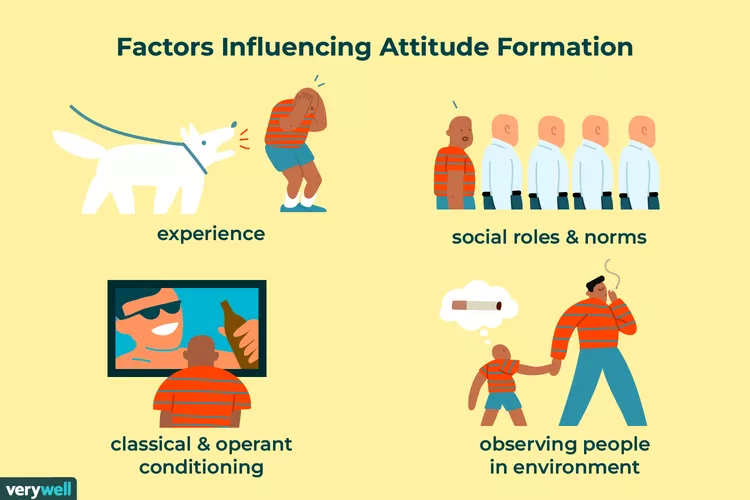POLIR-Society-Organization-Psychology-Attitude态度-The Components(成份) of Attitude: Formation(形成) of an Attitude and How It Can Be Changed 如何能改变
Theories > Social Psychology > The Components of Attitude
The Components of Attitude
Formation of an Attitude and How It Can Be Changed
By Kendra Cherry, MSEd Updated on May 05, 2024
Reviewed by David Susman, PhD
Attitudes can form through:
- direct experience,
- conditioning processes,
- observations,
- formal education,
- social role factors,
- cultural norm factors.

Table of Contents
Overview of Attitude
Attitude Formation
Attitudes Impact on Behavior
Why Attitudes Change
In psychology, an attitude refers to a set of emotions, beliefs, and behaviors toward a particular object, person, thing, or event.
Attitude can also be described as the way we evaluate something or someone.
For example, we tend to respond positively or negatively about certain subjects.
We can summarize the main components of attitude which are a collection of our thoughts, feelings, and actions in a given scenario. They are formed as a result of our life experiences, upbringing, education, and social influences.
Our positive and negative attitudes can have a powerful influence on our behavior in various situations. While attitudes are often enduring, they can also change.
Read on to discover more about the formation of attitudes and what factors are required for a change of heart.
Overview of Attitude
To understand the meaning of attitudes, it can be helpful to look at a few different examples. Consider what your attitude is about the following:
- The death penalty
- Which political party does a better job of running the country
- Whether prayer should be allowed in schools
- Whether violence on television should be regulated
Chances are that you probably have fairly strong opinions on these and other similar topics.
You've developed a passionate inner response about such issues,
which can influence how you feel, what you do, and how you interact with people.
Attitudes are an important topic of study within the field of social psychology.
But what exactly is an attitude? How does it develop?
How Psychologists Define Attitudes
Psychologists define attitudes as a learned tendency to view and judge things in a certain way.
This can include an evaluation of people, issues, objects, policies, or events.
It is an umbrella term that consists of our opinions, emotions, perceptions, beliefs, expectations, values, and intentions
Such dispositions are often positive or negative, but they can also be uncertain or neutral at times. For example, you might have mixed feelings about a particular person or issue.
Researchers also suggest that there are three main dimensions that make up our attitudes.
The components of attitudes are sometimes referred to as the ABC's of attitude.
3 Components of Attitude
- Affective Component: How the object, person, issue, or event makes you feel.
- Behavioral Component: How you respond to someone or something that elicits a set of feelings and beliefs. This can be a verbal or a physical response.
- Cognitive Component: Your perception, ideas, and beliefs
Attitudes can also be explicit and implicit.
- Explicit attitudes are those that we are consciously aware of and that clearly influence our emotional and behavioral reactions.
- Implicit attitudes are unconscious but still impact our emotions and behaviors.
Related: Does Implicit Bias Influence Our Behavior?
Attitude Formation
Several factors can influence how and why attitudes form, including:
Experience
Attitudes form directly as a result of personal experience with people, situations, objects, and ideologies.
For example,
- you may experience a social interaction in a favorable way and form a positive attitude about that person, family, or group.
- you may have an unpleasant encounter that influences an unfavorable attitude.
Learning
Attitudes can be learned in a variety of ways.
-
Classical Conditioning:
Consider how advertisers use classical conditioning to influence your attitude toward a particular product. In a television commercial, you see young, beautiful people having fun on a tropical beach while enjoying a sports drink. This attractive and appealing imagery causes you to develop a positive association with this particular beverage. -
Operant conditioning: Consider how rewards and punishments can influence our attitudes (known as operant conditioning). Imagine a young man who has just started smoking. Whenever he lights up a cigarette, people complain, chastise him, and ask him to leave their vicinity. This negative feedback from those around him eventually causes him to develop an unfavorable opinion of smoking and he decides to give up the habit.
-
Observational learning: Finally, people learn attitudes by observing people around them. When someone you admire greatly espouses a particular attitude, you are more likely to develop the same beliefs. For example, children spend a great deal of time observing the attitudes of their parents and usually begin to demonstrate similar outlooks. In addition, social media is having a profound influence on our attitudes as we are exposed to a variety of social media influencers.
Social and Cultural Factors
Social roles and cultural norms can have a strong influence on attitudes.
- Social roles relate to how people are expected to behave in a particular role or context.
- Cultural norms involve society's rules for what behaviors are considered appropriate.
Recap
Attitudes can form through:
- direct experience,
- conditioning processes,
- observations,
- formal education,
- social role factors,
- cultural norm factors.
Attitudes Impact on Behavior
We tend to assume that people behave according to their attitudes.
However, social psychologists have found that attitudes and actual behavior are not always perfectly aligned.
After all, plenty of people support a particular candidate or political party yet fail to vote.
Some situations may evoke a strong passionate response,
but the environment calls for self-control, professionalism, grace, and poise no matter how upset you may feel.
Essentially, people are more likely to behave according to their attitudes under certain conditions mitigated by personal values and social expectations.
Factors Influencing Attitude Strength
- You are an expert on the subject
- You have passion about the subject
- You experience something personally
- You are comfortable expressing your opinions
- You expect a favorable outcome
- You stand to lose something due to the issue
Why Attitudes Change
While attitudes can have a powerful effect on behavior, they are not set in stone.
The same influences that lead to attitude formation can also create attitude change.
Learning Theory
- Classical conditioning, operant conditioning, and observational learning can be used to bring about attitude change. Classical conditioning can be used to create positive emotional reactions to an object, person, or event by associating positive feelings with the target object.
- Operant conditioning can be used to strengthen desirable attitudes and weaken undesirable ones.
- People can also change their attitudes after observing the behavior of others.
Elaboration Likelihood Theory
This theory of persuasion suggests that people can alter their attitudes in two ways.
- They can be motivated to listen to an elaborate explanation and think about the message(central route persuasion), thus leading to an attitude shift.
- They might be influenced by the likable characteristics of the speaker (peripheral route persuasion), leading to a temporary or surface shift in attitude.
Messages that are thought-provoking and that appeal to logic are more likely to lead to permanent changes in attitudes.
Cognitive Dissonance Theory
In some cases, people may alter their attitudes to better align them with their current behaviors.
Cognitive dissonance is a phenomenon in which a person experiences psychological distress due to conflicting beliefs and behaviors.
To reduce this tension, people may change their attitudes to match their actual behaviors or alter their behavior to be more congruent with their beliefs.
Related: Cognitive Dissonance and the Discomfort of Holding Conflicting Beliefs
In order to minimize the cognitive dissonance between your conflicting attitude and behavior, you either have to change the attitude or change your actions.
Imagine the following situation:
You've always placed a high value on financial security, but you start dating someone very financially unstable. You have two options to reduce the tension caused by conflicting beliefs and behavior. You can end the relationship and seek a more financially secure partner, or you can de-emphasize the importance of fiscal stability and focus on other important character traits instead.
Recap
Attitudes are not set in stone and may change:
- when people learn new information,
- when they are persuaded by influential people,
- when they experience discomfort due to holding conflicting beliefs.
Final Thoughts
Attitudes play a pivotal role in shaping human behavior,
from the choices people make about living their lives to the health behaviors they engage in daily. Understanding where these attitudes come from and how they sometimes change can help you look for ways to improve your attitudes, whether it means adopting a more positive outlook on life or changing your opinion based on new information.
5 Sources
By Kendra Cherry, MS, MSEd
| Created By | Reviewed By | Date |
|---|---|---|
 Kendra Cherry, MS, is a psychosocial rehabilitation specialist, psychology educator, and author of the "Everything Psychology Book." |
 David Susman, PhD is a licensed clinical psychologist with experience providing treatment to individuals with mental illness and substance use concerns. |
MSEd Updated on May 05, 2024 |
Verywell Mind
- articles are reviewed by mental health professionals.
- Reviewers confirm the content is thorough and accurate, reflecting the latest evidence-based research.
- Content is reviewed before publication and upon substantial updates. Learn more.



 浙公网安备 33010602011771号
浙公网安备 33010602011771号